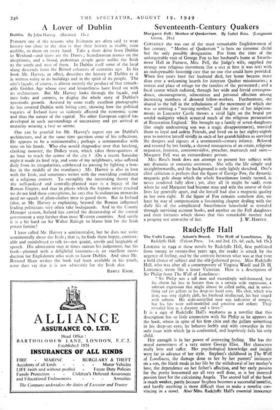Margaret Fell : Mother of Quakerism. By Isabel Ross. (Longman
Green. 21s.)
CERTAINLY she was one of the most remarkable Englishwomen of her century. "Mother of Quakerism " is-here no tiresome cliche but the only possible designation. For from the time of the unforgettable visit of George Fox to her husband's home at Swarth- moor Hall in Furness, Mrs. Fell, the Judge's wife, supplied the strange new religious movement (for a sect at first it was not) with an indispensable fostering care that no one else could have provided. When five years later her husband died, her home became more than ever a welcoming hearth for itinerant Quaker missionaries ; a retreat and place of refuge for the families of the persecuted ; and a focal centre which radiated, through her wide and fervid correspon- dence, encouragement, admonition and personal affection among increasing numbers of devoted fellow-workers. Furthermore, she shared to the full in the tribulations of the movement of which she was so untiring a "nursing mother," and the story of her imprison- ments in Lancaster Castle throws a vivid light on the brutal yet sordid malignity which actuatzd much of the religious persecution of Restoration England. She brought up a family of seven daughters (the single undeserving son was a tragic disappointment), married them to loyal and ardent Friends, and lived on to her, eighty-eighth year to interest herself vividly in such of her grandchildren as survived the dangers and rigours of a seventeenth-century infancy. Beloved and revered by her family, a shrewd manageress of an estate, religious organiser, feminist, controversialist, preacher, matriarch and saint— Margaret Fell was an extraordinary person.
Mrs. Ross's book does not attempt to present her subject with any dramatic or romantic overtones. She tells the life simply and straightforwardly, and the background is only lightly sketched. One's chief criticism is perhaps that the figure of George Fox, the dynamic magnetic pole about which the whole Swarthmoor family turned, is never rendered fully alive ' - yet, after all (it might be said), even when he and Margaret had become man and wife the course of their lives lay generally apart, and she herself had also a magnetic quality in her own right. If the figure of Fox remains somehow dim, we have by way of compensation a fascinating chapter dealing with the daily life of the complicated Swarthmoor household as revealed through surviving account books, and another on the Fell daughters and their fortunes which shows that this remarkable mother had


































 Previous page
Previous page